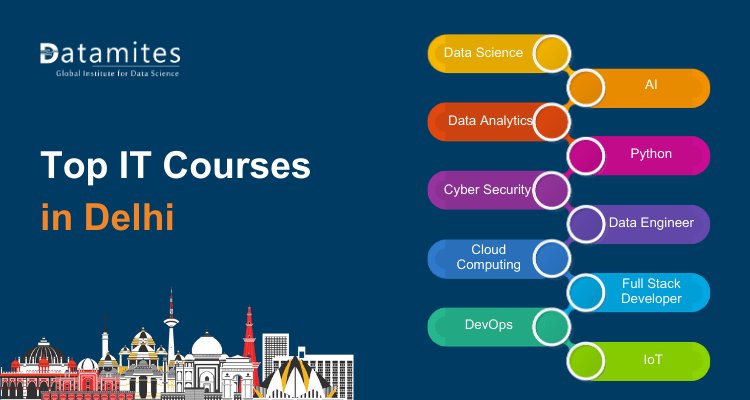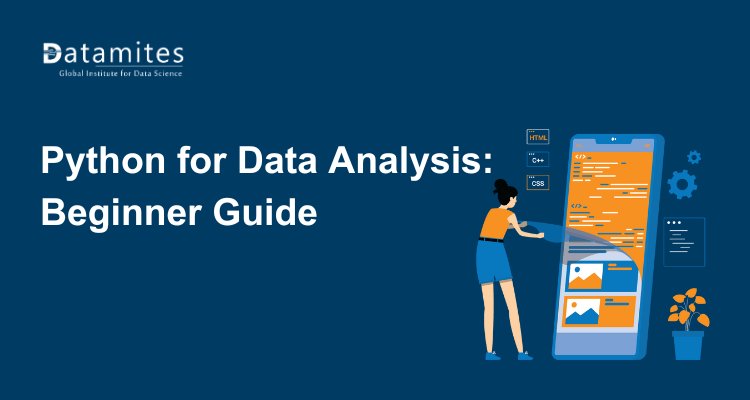Top IT Courses in Demand
Explore the top IT courses in demand, designed to equip you with essential skills for thriving in the ever-evolving tech industry. Stay ahead of the curve with courses in AI, data science, cybersecurity, and more.
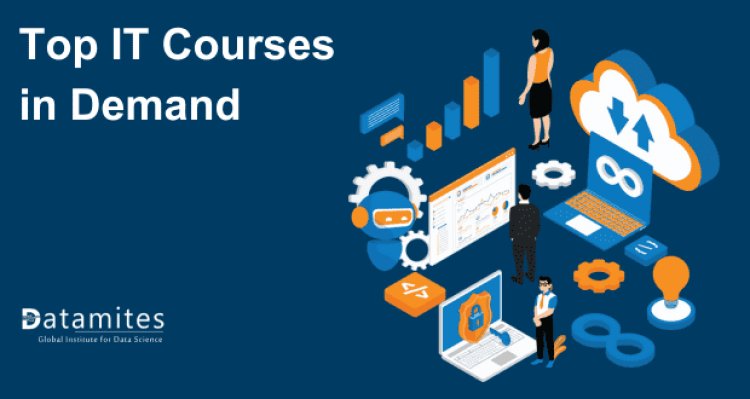
In today's age of technological progress, the demand for individuals possessing outstanding IT skills has surged significantly. Across all sectors, there has been a continuous increase in the integration of IT professionals into their workforce. Now, you can capitalize on the latest market trends to enhance your career prospects.
Importance of upskilling in the digital age
In today's rapidly evolving digital age, upskilling has become more critical than before. The relentless pace of technological advancements and the increasing integration of technology into various aspects of our lives has created a pressing need for individuals to continuously acquire new skills and knowledge. Without upskilling, individuals risk falling behind in their careers, missing out on job opportunities, and becoming less competitive in the job market.
According to an Industry Research Biz report, the worldwide Information Technology (IT) market achieved a total worth of approximately USD 9,481,627.92 million in 2022 and is anticipated to experience a compound annual growth rate (CAGR) of 11.0% throughout the forecast period. This growth trajectory is projected to lead to a market valuation of around USD 17,736,482.58 million by 2028.
This article aims to address the significance of upskilling in the digital age, with a particular focus on the field of Information Technology (IT). IT is one of the fastest-growing industries, and it plays a pivotal role in driving innovation across various sectors.
Key Trends in the IT Industry
The IT industry is currently witnessing several key trends driving demand. Cloud computing continues to dominate, with organizations adopting cloud-based solutions for flexibility and scalability. Additionally, cybersecurity remains a top priority as cyber threats evolve, leading to increased demand for experts in this field. The Internet of Things (IoT), artificial intelligence (AI), and machine learning (ML) are also shaping the industry, enabling automation and data-driven decision-making.
In this dynamic IT landscape, professionals must prioritize staying updated with the latest trends and technologies. Continuous learning and upskilling are essential to remain competitive and valuable in the industry. Certifications, online courses, and industry events are valuable resources for keeping pace with the rapidly evolving IT environment.
Top IT Courses in Demand
The top IT courses cover a range of technologies and skills, essential for staying competitive in the rapidly evolving tech industry. These courses include:
Data Science:
Data Science has emerged as a powerhouse in today's world, becoming a highly sought-after career path. The field presents a vast array of opportunities, with roles in Data Science offering attractive salaries that are among the highest in the job market. According to a study by Analytics Insight, it's projected that the number of data science job openings in India will more than double by 2025, reaching an estimated 137,630 positions.
Why a data science Course?
A data science course is essential because it equips individuals with the skills to analyze and derive meaningful insights from vast amounts of data. In today's data-driven world, businesses rely on data scientists to make informed decisions, optimize processes, and uncover hidden trends. Such courses provide a strong foundation in statistics, programming, and machine learning, making graduates highly sought after in various industries.
What is the Scope and Opportunity of Data Science?
The scope of data science is extensive and continuously expanding. It encompasses various domains, including business, healthcare, finance, and technology, where data-driven insights are crucial for decision-making and problem-solving. With the proliferation of data and advancements in technology, data scientists have opportunities to work on diverse projects, from predictive analytics and machine learning to data ethics and privacy.
According to a Precedence Research report, the global data science market was valued at $112.12 billion in 2022 and is projected to reach approximately $501.03 billion by 2032, with an expected annual growth rate of 16.2% from 2023 to 2032.
Data science offers abundant career opportunities across industries. Data scientists can work in roles such as data analysts, machine learning engineers, data engineers, and AI researchers. They are highly sought after for their ability to extract insights from data, drive innovation, and solve complex problems. As organizations prioritize data-driven decision-making, data science professionals can expect a wide range of job openings and the potential for career growth in a rapidly evolving field.
Refer these articles:
- Mastering Data Science in India
- A Comprehensive Guide on the Data Science Lifecycle
- What Does a Data Scientist Do
- Data Science Course Fee in India
Which industries and leading companies are actively recruiting data scientist talent?
Data scientist positions are available across a wide spectrum of sectors, including banking, finance, insurance, media, healthcare, retail, telecommunications, and the automotive industry.
Highly regarded employers for data scientists include
- Microsoft
- Amazon
- Adobe
- Accenture
- Deloitte
- IBM
What are the Eligibility Requirements for data science?
Achieving the status of a data scientist typically necessitates a blend of educational attainment, proficiency, and practical experience. Here are the key eligibility criteria and skills required to pursue a career as a data scientist:
Eligibility Criteria:
Educational Background: A strong foundation in mathematics and statistics is essential. Most data scientists have at least a bachelor's degree in a related field, such as computer science, mathematics, statistics, physics, or engineering. Many have advanced degrees (master's or Ph.D.) as well.
Programming Skills: Proficiency in programming is crucial. You should be skilled in languages such as Python or R, which are widely used for data analysis and machine learning.
Domain Knowledge: Depending on the industry or domain you want to work in, having domain-specific knowledge can be an advantage. For example, if you want to work in healthcare, understanding medical terminology and concepts would be beneficial.
Data Handling Skills: You should be comfortable working with data. This includes data collection, cleaning, and preprocessing.
Skills Required:
- Statistical Analysis: Proficiency in statistical methods and hypothesis testing is crucial for making data-driven decisions.
- Machine Learning: Knowledge of various machine learning algorithms, including supervised, unsupervised, and reinforcement learning, as well as experience in model selection and evaluation.
- Data Manipulation: Skills in data cleaning, data wrangling, and feature engineering are necessary to prepare data for analysis.
- Data Visualization: Ability to create meaningful and insightful visualizations to communicate findings effectively.
- Coding: Strong coding skills in languages like Python or R for implementing data analysis and machine learning algorithms.
Certifications:
Certifications can help boost your credentials and demonstrate your expertise to potential employers. Some relevant certifications for data scientists include:
- Certified Data Scientist (CDS): Offered by various organizations, Certified Data Scientist certification assesses your skills and knowledge in data science concepts and tools.
- Google Data Analytics Professional Certificate: Provides hands-on experience with data analysis tools and techniques.
- IBM Data Science Professional Certificate: Covers various aspects of data science, including data analysis, machine learning, and data visualization.
- Microsoft Certified: Azure Data Scientist Associate: Focuses on using Azure tools for data analysis and machine learning.
How much is the salary of a Data Scientist Worldwide?
Here is a global overview of data scientist salaries:
- The salary of a data scientist in UK ranges from GBP 50,584 per year according to an Indeed report.
- The salary of a data scientist in USA ranges from USD 124,500 per year according to an Indeed report.
- The salary of a data scientist in Canada ranges from CAD 89,012 per year according to an Indeed report.
- The salary of a data scientist in Australia ranges from AUD 118,890 per year according to an Indeed report.
- The salary of a data scientist in Germany ranges from EUR 70,000 per year according to a Glassdoor report.
- According to a report from Glassdoor, the annual salary for a data scientist in India varies, starting from INR 13,50,000.
- The salary of a data scientist in Switzerland ranges from CHF 1,16,941 per year according to a Glassdoor report.
- The salary of a data scientist in Saudi Arabia ranges from SAR 154,839 per year according to a PayScale report.
- The salary of a data scientist in South Africa ranges from ZAR 673,621 per year according to an Indeed report.
- The salary of a data scientist in UAE ranges from AED 177,901 per year according to an Indeed report.
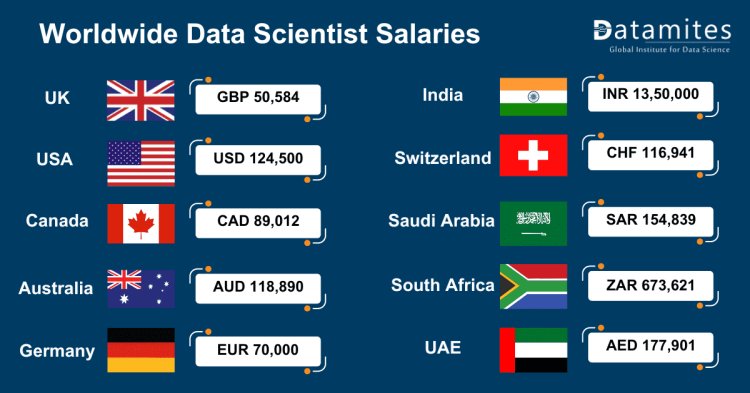
How to find the best Data Science Course?
To find the best Data Science Course, follow these steps:
- Research: Seek out institutions known for their excellent Data Science education by browsing online, reading reviews, and seeking recommendations.
- Curriculum: Evaluate the curriculum to ensure it covers relevant topics like statistics, machine learning, data analysis, and programming languages like Python and R.
- Faculty: Please review the credentials and professional background of the instructors. Experienced faculty can provide valuable insights.
- Facilities: Visit the institute if possible to assess the quality of classrooms, labs, and technological resources.
- Alumni Network: Inquire about the institute's alumni network and job placement record. Good connections can lead to job opportunities.
- Flexibility: Consider factors like class timings, online options, and course duration to fit your schedule and learning style.
- Internship Opportunities: When selecting the best institute for Data Science, consider institutions that offer robust internship opportunities with industry-leading companies to gain practical experience.
- Certification: Ensure the institute offers recognized data science certifications that are valuable in the job market.
- Career Support: Check if the institute provides career services, such as resume building, interview preparation, and job placement assistance.
A Data Science course equips you with the essential skills to navigate the data-driven world, enabling you to extract valuable insights, make informed decisions, and contribute to the future of technology and innovation. Embrace the limitless possibilities that await in this dynamic field, as you embark on a journey to unlock the potential of data and shape a successful career. Start your Data Science course today and be a part of the exciting revolution that's transforming industries across the globe. Your future in data science awaits!
Artificial Intelligence
Artificial intelligence (AI) is currently the most prominent buzzword in the tech industry, with major enterprises harnessing its power to enhance their operations. AI is rapidly becoming an integral part of our daily routines, generating employment opportunities across various industries and paving the way for innovative career prospects in the field.
According to a report from Allied Market Research, the Artificial Intelligence market is set to achieve significant value, projected to reach $1,581.70 Billion by the year 2030. This impressive growth is attributed to a robust compound annual growth rate (CAGR) of 38.0%. As AI continues to advance, it promises to shape the future of technology and employment landscapes.
Why Artificial Intelligence Course?
An Artificial Intelligence course offers a transformative learning experience that delves into the heart of one of the most dynamic and influential technologies of our time. By enrolling in such a program, you gain the knowledge and skills necessary to navigate the complexities of AI, including machine learning and deep learning. This not only opens the door to a wide range of career opportunities but also empowers you to contribute to groundbreaking innovations that are shaping industries across the globe.
What is the Scope and Opportunity of Artificial Intelligence?
The scope of Artificial Intelligence (AI) is vast and continuously expanding. AI has applications in diverse industries such as healthcare, finance, manufacturing, and more. It offers the potential to automate routine tasks, enhance decision-making processes, and drive innovation. With ongoing advancements, the scope of AI presents promising career opportunities and the potential to revolutionize how we work and live in the future.
As per data from the US Bureau of Labor Statistics, there is an anticipated 21 % growth expected in artificial intelligence careers between the years 2021 and 2031.
The opportunity presented by Artificial Intelligence (AI) is immense. AI can automate repetitive tasks, leading to increased efficiency and productivity across industries. It offers the potential to analyze vast amounts of data for actionable insights, enabling better decision-making. Furthermore, AI-driven technologies like machine learning and natural language processing are paving the way for new applications and job opportunities in fields such as data science, robotics, and autonomous systems.
Read these articles:
- Artificial Intelligence vs Machine Learning
- Advantages and Disadvantages of Artificial Intelligence
- Artificial Intelligence Course Fee in India
What are the Top Companies and Industries Hiring Artificial Intelligence Engineers?
AI engineers are highly sought after across a diverse range of sectors, spanning from finance and healthcare to manufacturing and retail. Prominent companies such as Google, Amazon, Cognizant, Microsoft, Tata Consultancy Services, and Wipro are just a handful of the leading organizations actively seeking AI engineers to meet their evolving technological needs.
What is the Eligibility and Skills required to become an Artificial Intelligence Engineer?
To become an Artificial Intelligence Engineer, you need a combination of educational qualifications and specific skills. Here's an overview of the typical eligibility and skills required:
Eligibility:
Educational Background:
- Bachelor's degree in computer science, computer engineering, data science, mathematics, or a related field is the minimum requirement.
- Many AI engineers hold advanced degrees (master's or Ph.D.) for more specialized roles or research positions.
Skills:
Programming Languages:
- Proficiency in programming languages is essential, with Python being the most commonly used language for AI development.
- Familiarity with languages like Java, C++, or R can also be valuable.
Mathematics and Statistics:
- A strong mathematical background, including linear algebra, calculus, probability, and statistics, is crucial for understanding AI algorithms and models.
Machine Learning and Deep Learning:
- In-depth knowledge of machine learning techniques, algorithms, and frameworks is necessary.
- Understanding deep learning concepts, neural networks, and popular deep learning libraries like TensorFlow or PyTorch is vital.
Data Handling and Preprocessing:
- The ability to clean, preprocess, and analyze data is fundamental for AI engineers.
- Proficiency in data manipulation libraries like Pandas is valuable.
AI Libraries and Frameworks:
- Familiarity with AI libraries and frameworks, such as scikit-learn, Keras, and OpenCV, is essential for implementing AI solutions.
Natural Language Processing (NLP):
- For roles involving text and language processing, expertise in NLP techniques and libraries like NLTK or spaCy is beneficial.
Certifications:
Certifications serve as evidence of your expertise and dedication to prospective employers. Some relevant Artificial Intelligence certifications include:
- TensorFlow Developer Certificate: Demonstrates your proficiency in using TensorFlow for building deep learning models.
- PyTorch Certification: Validates your expertise in using PyTorch for deep learning projects.
- Google Cloud AI Engineer: Focuses on designing, building, and deploying machine learning models on Google Cloud.
- Microsoft Certified: Azure AI Engineer Associate: Demonstrates your ability to implement AI solutions on the Azure cloud platform.
- Certified Artificial Intelligence Engineer (CAIE): Offered by various organizations, Certified Artificial Intelligence Engineer certification assesses your AI knowledge and skills.
How much is the Artificial Intelligence Engineers salary worldwide?
- The salary of an artificial intelligence engineer in UK ranges from GBP 57,630 per year according to a Glassdoor report.
- The salary of an artificial intelligence engineer in the USA ranges from USA 1,60,910 per year according to a Glassdoor report.
- The salary of an artificial intelligence engineer in Canada ranges from CAD 100,058 per year according to a Glassdoor report.
- The salary of an artificial intelligence engineer in Australia ranges from AUD 116,000 per year according to a Glassdoor report.
- The salary of an artificial intelligence engineer in Germany ranges from EUR 92,554 per year according to a Economic Research Institute report.
- The salary of an artificial intelligence engineer in Switzerland ranges from CHF 131000 per year according to a PayScale report.
- The salary for an artificial intelligence engineer in Saudi Arabia ranges from SAR 175000 per year according to a PayScale report.
- The salary of an artificial intelligence engineer in South Africa ranges from ZAR 645000 per year according to a PayScale report.
- According to a Glassdoor report, the annual salary for an artificial intelligence engineer in India starts at INR 11,00,000
- The salary of an artificial intelligence engineer in UAE ranges from AED 345,45 per year according to an Economic Research Institute report.
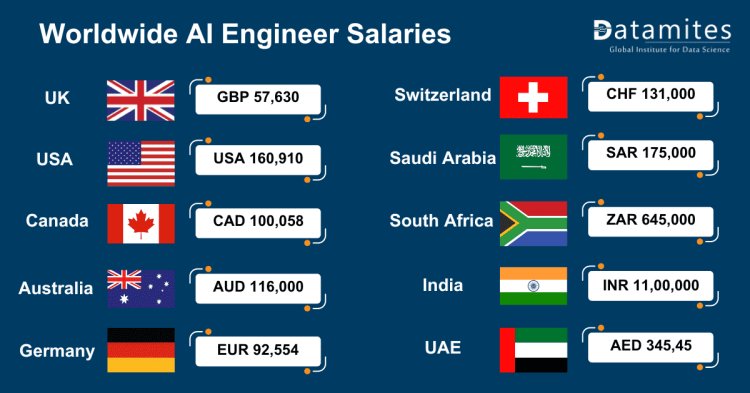
How to find the best Artificial Intelligence Course Institute?
Finding the best Artificial Intelligence institute can be a critical decision that impacts your learning experience and career prospects. To find the most suitable AI course institute, consider the following steps:
Define Your Goals:
Determine your specific interests and goals within the field of AI. Are you interested in machine learning, deep learning, natural language processing, computer vision, or AI ethics? Knowing your focus will help you narrow down your choices.
Research Online:
- Start by conducting online research. Look for AI course institutes, universities, colleges, and online platforms that offer AI courses. Explore their websites and course catalogs.
Check Accreditation and Reputation:
- Ensure that the institute or platform you choose is accredited and has a good reputation. Look for reviews and testimonials from previous students.
Course Content and Curriculum:
- Review the course content and curriculum in detail. Ensure that it covers the topics you are interested in and provides a comprehensive understanding of AI.
Faculty and Instructors:
- Investigate the qualifications and experience of the instructors or faculty members. Experienced and knowledgeable instructors can make a significant difference in your learning experience.
Mode of Instruction:
- Reflect on whether you lean towards traditional in-person classes, online courses, or a blend of the two.
- Choose an institute that offers the mode of instruction that suits your learning style and convenience.
Hands-on Projects and Practical Experience:
- Practical experience is crucial in AI. Check if the course includes hands-on projects, real-world applications, and opportunities to work on AI projects.
Flexibility:
- Consider your schedule and whether the course offers flexibility in terms of timing and duration. Some programs may be part-time or self-paced, allowing you to balance learning with other commitments.
Certification:
- Determine whether the institute offers recognized artificial intelligence certifications upon course completion. Having a certification can enhance your credibility in the job market.
Cost and Financial Aid:
- Consider your budget and compare the costs of different courses or programs. Also, check if there are any scholarships, grants, or financial aid options available.
Career Services:
- Find out if the institute offers career services, such as job placement assistance, resume building, or interview coaching, to help you secure AI-related positions.
A career in AI offers an exciting and rapidly evolving landscape for professionals. With the increasing demand for AI expertise, individuals in this field can anticipate numerous avenues for growth and innovation. AI careers require a combination of technical skills and creative problem-solving, making them intellectually stimulating and rewarding. As AI continues to transform industries, AI professionals play a pivotal role in shaping the future of technology and society.
Machine Learning
Machine learning (ML) is currently one of the most prominent buzzwords in the tech industry, with major enterprises leveraging its capabilities to optimize their operations. ML is swiftly becoming an indispensable part of our daily lives, creating job prospects across diverse sectors and opening up exciting career opportunities in the field.
According to a Precedence Research report, the worldwide machine learning market was assessed to be approximately USD 38.11 billion in 2022, and it is expected to exceed USD 771.38 billion by the year 2032. This growth is anticipated to occur at a compound annual growth rate (CAGR) of 35.09% over the forecast period spanning from 2023 to 2032.
Why Machine Learning Course?
A machine learning course provides essential knowledge and skills for harnessing the power of data-driven decision-making. It equips individuals with the ability to develop predictive models, analyze complex datasets, and solve real-world problems. With the increasing integration of ML across industries, this course opens doors to lucrative career opportunities and ensures adaptability in the rapidly evolving tech landscape. Ultimately, mastering machine learning is key to staying competitive and making valuable contributions in the digital age.
What is the Scope and Opportunity of Machine Learning?
The scope of machine learning is exceptionally promising, with applications spanning across industries such as healthcare, finance, e-commerce, and more. As data continues to grow, the demand for machine learning experts is on the rise, creating a vast job market. Machine learning offers the potential for groundbreaking innovations and insights, making it a critical field for technological advancement. For individuals willing to invest in this domain, a rewarding and dynamic career awaits.
According to a recent study by the World Economic Forum (WEF), the Indian job market is projected to experience a significant 22% growth in the next five years. The report highlights that the most promising career opportunities will arise from sectors like artificial intelligence (AI), machine learning, and data analysis.
Machine learning offers a wealth of opportunities in today's data-driven world. It enables businesses to make data-driven decisions, enhance customer experiences, and automate processes, leading to increased efficiency and profitability. In fields like healthcare, it aids in disease diagnosis and treatment planning. With the continuous growth of data and advancements in AI, the opportunities in machine learning are boundless, making it a valuable and versatile career path.
Refer these articles:
- Machine Learning Course Fee in India
- Guide to Machine Learning Career
- Deep Learning vs Machine Learning
What are the Top Companies and Industries Hiring Machine Learning Engineers?
Machine learning engineers are in high demand across a diverse spectrum of industries, including finance, healthcare, manufacturing, and retail. Prominent companies like Google, Amazon, Cognizant, Microsoft, Tata Consultancy Services, and Wipro are just a few examples of leading organizations actively recruiting machine learning engineers to address their evolving technological requirements.
What is the Eligibility and Skills required to become a Machine Learning Engineer?
To become a machine learning engineer, you typically need a combination of education, skills, and experience. Here's a breakdown of the eligibility and skills required:
Educational Background:
Bachelor's Degree: You will typically need at least a bachelor's degree in a related field such as computer science, mathematics, statistics, or engineering. Some machine learning engineers also have backgrounds in physics, neuroscience, or other quantitative disciplines.
Core Skills:
Programming Languages: Mastery of programming languages such as Python and R is indispensable. Python is especially popular for machine learning due to its extensive libraries and frameworks (e.g., TensorFlow, PyTorch, scikit-learn).
Mathematics and Statistics: A solid understanding of mathematics and statistics is essential. You'll need to understand concepts like linear algebra, calculus, probability, and statistics to build and optimize machine learning models.
Machine Learning Algorithms: In-depth knowledge of machine learning algorithms, including supervised learning, unsupervised learning, reinforcement learning, and deep learning is necessary.
Data Preprocessing: Skills in data cleaning, feature engineering, and data normalization are important to prepare data for training machine learning models.
Data Visualization: The ability to visualize and interpret data using tools like Matplotlib or Seaborn is valuable for understanding and communicating insights.
Certification:
Obtaining certifications can effectively showcase your expertise and dedication to prospective employers. Here are some relevant certifications:
- Google Cloud Professional Machine Learning Engineer: This certification focuses on Google Cloud's machine learning services and technologies.
- AWS Certified Machine Learning - Specialty: Offered by Amazon Web Services, this certification validates your knowledge of AWS machine learning services.
- Microsoft Certified: Azure AI Engineer Associate: Focused on Azure's AI and machine learning services, this certification demonstrates your expertise in using Microsoft's cloud platform for machine learning.
How much is the Machine Learning Engineer's salary worldwide?
- The salary of a machine learning engineer in UK ranges from GBP 63,211 per year according to a Indeed report.
- The salary of a machine learning engineer in USA ranges from USD159,938 per year according to a Indeed report.
- The salary of a machine learning engineer in Canada ranges from CAD 1,12,915 per year according to a Glassdoor report.
- The salary of a machine learning engineer in Australia ranges from AUD 146,481 per year according to a Indeed report.
- The salary of a machine learning engineer in Germany ranges from EUR 64,260 per year according to a Glassdoor report.
- The salary of a machine learning engineer in Switzerland ranges from CHF 1,00,000 per year according to a Glassdoor report.
- The salary of a machine learning engineer in Saudi Arabia ranges from SAR 14,500 per month according to a Glassdoor report.
- The salary of a machine learning engineer in South Africa ranges from ZAR 586,389 per year according to a Indeed report.
- The salary of a machine learning engineer in India ranges from INR 11,00,000 per year according to a Glassdoor report.
- The salary of a machine learning engineer in UAE ranges from AED 21,000 per month according to a Glassdoor report.
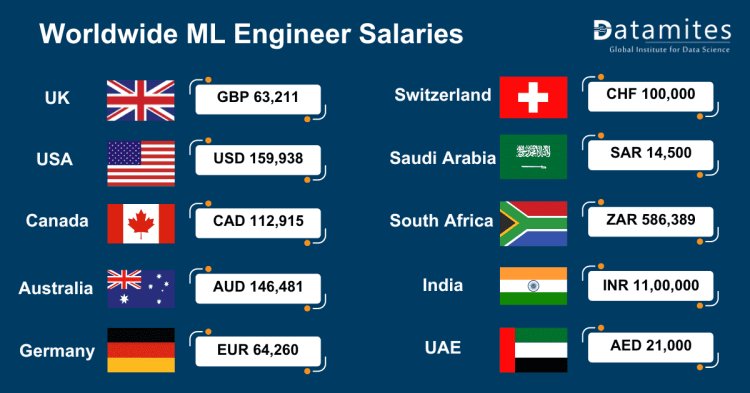
How to find the best institute for Machine Learning Courses?
Finding the best institute for machine learning courses can be a crucial step in your career development. Here are some steps and considerations to help you identify the right institute or course:
Define Your Goals:
- Determine your specific learning objectives. Are you looking for a comprehensive machine learning degree program, a shorter specialized course, or something in between? Understanding your goals will help you narrow down your options.
Research Online:
- Begin by conducting an online search, utilizing search engines, educational platforms, and social media to explore institutes and courses. Prominent platforms provide a diverse selection of machine learning courses.
Check Accreditation:
- Ensure that the institute or course you're considering is accredited and reputable. Look for affiliations with well-known universities or industry organizations.
Read Reviews and Testimonials:
- Look for reviews and testimonials from students who have taken the course or program. These can provide insights into the quality of instruction, course content, and student experiences.
Explore the Curriculum:
- Check over the course syllabus or curriculum to confirm that it encompasses the subjects and abilities you aim to acquire. Check if it includes hands-on projects and practical applications.
Check the Instructors Qualifications:
- Please investigate the qualifications and background of the course instructors. Instructors possessing industry experience or academic expertise can offer valuable insights.
Cost and Financial Aid:
- Evaluate the cost of the course or program. Check if financial aid, scholarships, or payment plans are available. Keep in mind that higher cost doesn't always mean better quality.
Check for Job Placement Assistance:
- If your goal is to transition into a machine learning career, inquire about job placement assistance or career services offered by the institute.
A career in machine learning offers exciting opportunities at the forefront of technological innovation. With the right education, skills, and continuous learning, you can contribute to solving complex real-world problems, making data-driven decisions, and shaping the future of artificial intelligence. The demand for machine learning professionals continues to grow, making it a promising and rewarding field for those passionate about data and algorithms.
Cyber Security
In light of the escalating frequency of cyber-attacks, safeguarding against such threats has become imperative for all organizations, as they all possess sensitive information that must remain secure. The existing deficit in the number of cyber security experts underscores the attractiveness of pursuing a career in this field for those with a genuine interest.
Why Cyber Security Course?
A Cybersecurity course is indispensable in today's digital landscape due to the relentless surge in cyber threats. These courses equip individuals with the expertise to defend against evolving cyberattacks, ensuring the integrity and confidentiality of sensitive information.
A report by Grand View Research indicates that the global cybersecurity market reached an approximate value of USD 202.72 billion in 2022. It is expected to show a compound annual growth rate (CAGR) of 12.3% from 2023 to 2030.
Moreover, the high demand for cyber security professionals makes this training a strategic investment in a promising career path with ample opportunities for growth and contribution to safeguarding the digital realm.
What is the Scope and Opportunity of Cyber Security?
Scope of Cyber Security:
Cybersecurity offers a vast and expanding scope in today's digital age. With the relentless growth of technology, there is an ever-increasing need for experts who can protect sensitive data and systems from cyber threats.
The Bureau of Labor Statistics (BLS) forecasts a 33% growth in employment opportunities for information security analysts from 2020 to 2030.
As organizations across industries recognize the importance of cybersecurity, the scope for careers in this field is vast, ranging from ethical hacking and risk assessment to security management and incident response.
Opportunities in Cyber Security:
The opportunities in the field of cybersecurity are abundant and diverse. Cybersecurity professionals can find employment in various sectors, including government agencies, financial institutions, healthcare, and technology companies. Job roles encompass cybersecurity analysts, penetration testers, security architects, and chief information security officers (CISOs). The increasing demand for cybersecurity experts, coupled with competitive salaries, makes it a promising and lucrative career path for individuals with the requisite skills and knowledge.
What are the Top Companies and Industries Hiring?
A diverse array of sectors is actively recruiting cybersecurity experts, spanning finance, healthcare, government, and technology. Prominent organizations such as Deloitte, IBM, Amazon, Cisco, and Microsoft are at the forefront of hiring cybersecurity professionals. This demand underscores the broad appeal and lucrative opportunities available within the field, making it an attractive career choice for those seeking to protect digital assets and combat cyber threats. As technology advances, the need for cybersecurity expertise is expected to grow even further, promising a secure and rewarding career path.
What is the Eligibility and Skills required to become a Cyber Security professional?
Becoming a cybersecurity professional requires a blend of education, abilities, and certifications. Here's a breakdown of the eligibility criteria, essential skills, and recommended certifications:
Eligibility:
Educational Background: Typically, a bachelor's degree in a related field such as Computer Science, Information Technology, Cyber Security, or a similar discipline is preferred. However, some entry-level positions or certifications may not require a degree.
Skills:
- Technical Skills: Proficiency in various technical areas is crucial, including:
- Network security: Understanding of network protocols, firewalls, VPNs, and intrusion detection systems.
- Operating systems: Knowledge of Windows, Linux, and other common OS platforms.
- Programming and scripting: Familiarity with languages like Python, PowerShell, or JavaScript.
- Vulnerability assessment: Ability to identify and address security vulnerabilities.
- Malware analysis: Analyzing and mitigating malware threats.
- Cybersecurity Tools: Mastery of Cyber Security tools and software, including antivirus programs, penetration testing tools, and security information and event management (SIEM) systems.
- Problem-Solving: Strong analytical and problem-solving skills to identify and respond to security incidents effectively.
- Ethical Hacking: For roles such as ethical hackers or penetration testers, expertise in understanding and exploiting vulnerabilities in systems and applications.
- Communication Skills: Effective communication is essential for conveying security risks and solutions to non-technical stakeholders and collaborating with team members.
Certifications:
- Certifications can enhance your qualifications and credibility as a Cyber Security professional. Some popular certifications include
- Certified Information Systems Security Professional (CISSP): An internationally acknowledged certification for roles involving information security management and leadership.
- Certified Ethical Hacker (CEH): Emphasizing ethical hacking methods and software to pinpoint weaknesses.
- Certified Information Security Manager (CISM): Highlights the importance of managing information risk and governance.
- Certified Information Systems Auditor (CISA): Emphasizes on auditing, overseeing, and providing assurance.
- CompTIA Security+: A foundational certification covering essential security concepts.
How much is the Cyber Security Analyst's salary worldwide?
- The salary of a cyber security analyst in India ranges from INR 5,89,498 per year according to a Glassdoor report.
- The salary of a cyber security analyst in UK ranges from GBP 43,285 per year according to an Indeed report.
- The salary of a cyber security analyst in USA ranges from USD 1,05,180 per year according to a Glassdoor report.
- The salary of a cyber security analyst in Saudi Arabia ranges from SAR 1,31,545 per year according to a PayScale report.
- The salary of a cyber security analyst in Germany ranges from EUR 71,152 per year according to a Glassdoor report.
- The salary of a cyber security analyst in South Africa ranges from ZAR 8,18,215 per year according to an Indeed report.
- The salary of a cyber security analyst in Switzerland ranges from CHF 1,09,977 per year according to a Glassdoor report.
- The salary of a cyber security analyst in UAE ranges from AED 15,000 per month according to an Glassdoor report.
- The salary of a cyber security analyst in Canada ranges from CAD 86,612 per year according to an Indeed report.
- The salary of a cyber security analyst in Australia ranges from AUD 97,000 per year according to a Glassdoor report.
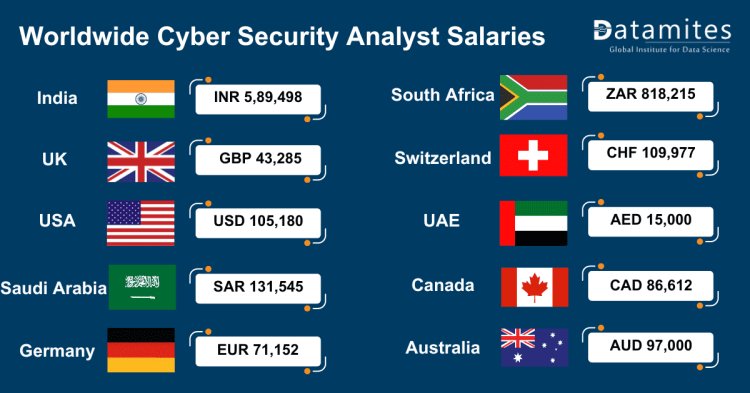
How to find the best Cyber security course Institute?
Finding the best cybersecurity course institute requires careful research and consideration. Cybersecurity is a rapidly evolving field, so it's essential to choose an institute that provides up-to-date and comprehensive training. Here are some steps to help you find the right cybersecurity course institute:
- Accreditation: Ensure the institute is accredited by recognized organizations or authorities in the field of cybersecurity.
- Course Content: Review the course curriculum to ensure it covers a comprehensive range of cybersecurity topics, including the latest threats and technologies.
- Instructors: Research the qualifications and industry experience of the instructors who will be teaching the courses.
- Reviews and Recommendations: Seek feedback from current or former students, and read online reviews to gauge the institute's reputation.
- Certifications: Check if the courses offer cybersecurity certifications recognized by the industry.
- Practical Experience: Look for institutes that provide hands-on labs and real-world scenarios to apply theoretical knowledge.
- Internship Opportunities: Look for institutes that offer internship programs or partnerships with organizations, providing practical experience and networking opportunities during your course.
- Job Placement Assistance: Inquire about job placement services and industry connections that can help you secure Cyber Security positions after completion.
- Flexible mode of training: Consider the flexibility of course schedules and formats, including online and in-person options.
- Career Guidance: Look for institutes that offer career counselling and job placement assistance to help you transition into a Cyber Security role seamlessly.
A career in cybersecurity offers the opportunity to protect organizations from cyber threats, safeguard sensitive data, and ensure the integrity of digital systems. It involves tasks such as vulnerability assessment, threat detection, and incident response, making it a dynamic and high-demand field. With the ever-growing importance of digital security, a career in cybersecurity promises stability and the chance to make a significant impact in the world of technology.
Data Analytics
The increased volume of data generated across industries, harnessing the power of data analytics has become a critical imperative for organizations. Every company possesses vast datasets that hold the potential to drive informed decision-making and gain a competitive edge.
Why a data analytics course?
A Data Analytics Course is essential in today's data-driven world. It equips individuals with the skills to extract valuable insights from vast datasets, enabling data-informed decision-making. As organizations increasingly rely on data for their strategies, a Data Analytics course opens doors to a wide range of high-demand career opportunities across industries.
The most recent NASSCOM report predicts that India's Big Data Analytics industry will reach a market value of USD 16 billion, with an anticipated compound annual growth rate (CAGR) of 26% between 2019 and 2025.
Data Analytics education empowers individuals to play a pivotal role in harnessing the power of data for better business outcomes.
What is the Scope and Opportunity of Data Analytics?
Data analytics has a vast and expanding scope in today's data-driven world. It encompasses the process of examining, cleansing, transforming, and interpreting data to extract valuable insights and support informed decision-making. With the increasing volume and variety of data generated across industries, data analytics is crucial for identifying trends, optimizing operations, enhancing customer experiences, and gaining a competitive edge
According to IndiaAI.Gov.In report, the outlook for data analyst positions is optimistic, expecting a 27% increase in the next ten years. This rise in demand is fueled by the growing amount of data that companies must manage and their aspiration to utilize it more efficiently.
The opportunity in data analytics is abundant and promising. Organizations are actively seeking skilled data analysts and data scientists to harness the power of data for strategic advantage. Data analysts are responsible for turning raw data into actionable insights, while data scientists often tackle more complex problems using advanced techniques and machine learning. This field offers diverse career paths, including data engineering, business intelligence, data visualization, and predictive analytics.
Refer these articles:
What are the Top Companies and Industries Hiring Data Analysts?
Data analysts are in high demand across various sectors, including finance, healthcare, manufacturing, and retail. Prominent companies like Google, Amazon, Microsoft, JPMorgan Chase, and Walmart are actively recruiting data analysts to harness insights from data and drive decision-making. These organizations are among the leading employers seeking data analysts to address their evolving analytical requirements.
What is the Eligibility and Skills required to become a Data Analyst?
To become a data analyst, you typically need the following eligibility criteria and skills:
Eligibility:
Educational Background: Most data analyst positions require at least a bachelor's degree in a related field such as mathematics, statistics, computer science, economics, or a related quantitative discipline. Some roles may prefer or require a master's degree for advanced positions.
Skills:
- Analytical Skills: Data analysts should have strong analytical skills to interpret data, identify trends, and draw meaningful insights from complex datasets.
- Statistical Knowledge: A good grasp of statistics is crucial for data analysis, including concepts like hypothesis testing, regression analysis, and probability theory.
- Data Manipulation: Proficiency in data manipulation tools and languages such as SQL, Python, or R is essential for gathering, cleaning, and transforming data.
- Data Visualization: Data analysts ought to possess proficiency in utilizing visualization tools such as Tableau, Power BI, or matplotlib to generate charts, graphs, and dashboards for effective data representation.
Certifications:
Certifications can enhance your credibility as a data analyst and demonstrate your proficiency. Some relevant certifications include:
- Certified Analytics Professional (CAP): Offered by INFORMS, this certification is a recognized credential for analytics professionals.
- Microsoft Certified Data Analyst Associate: Focused on data analysis using Power BI and SQL.
- Google Data Analytics Professional Certificate: Covers key data analysis tools and concepts.
How much is the worldwidee salary of a Data Analyst?
- The salary of a data analyst in UK ranges from GBP26,326 per year according to an Indeed report.
- The salary of a data analyst in USA ranges from USD 84,584 per year according to Built. In report.
- The salary of a data analyst in Canada ranges from CAD 67,118 per year according to an Indeed report.
- The salary of a data analyst in Australia ranges from AUD 93,601 per year according to an Indeed report.
- The salary of a data analyst in Germany ranges from EUR 91,938 per year according to a Salary Expert report.
- The salary of a data analyst in India ranges from INR 5,44,431 per year according to an Indeed report.
- The salary of a data analyst in Switzerland ranges from CHF 1,01,239 per year according to a Glassdoor report.
- The salary of a data analyst in Saudi Arabia ranges from SAR 175,000 per year according to a Salary Explorer report.
- The salary of a data analyst in South Africa ranges from ZAR 308,350 per year according to an Indeed report.
- The salary of a data analyst in UAE ranges from AED 78,269 per year according to an Indeed report.
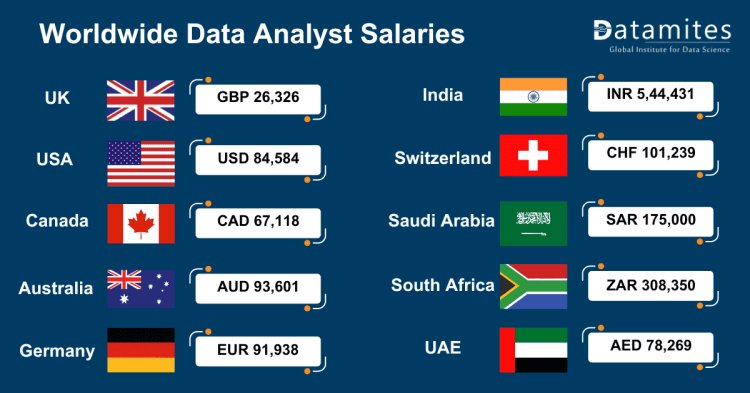
How to find the right data analytics course institute?
To find the right data analytics course institute, consider the following steps:
- Define your goals: Determine your specific learning objectives and career goals in data analytics.
- Research institutes: Find credible universities or institutes providing data analytics courses, taking into account factors such as their location, reputation, and range of programs available.
- Check accreditation: Ensure that the institute is accredited and recognized in the field of data analytics.
- Curriculum and content: Review the course curriculum to ensure it covers relevant topics and technologies in data analytics.
- Faculty expertise: Investigate the qualifications and experience of the instructors or professors.
- Student reviews: Read reviews and testimonials from previous students to gauge the quality of the program.
- Course format: Consider whether the institute offers online, in-person, or blended learning options that fit your schedule and preferences.
- Internship opportunities: Look for institutes that offer internship programs as part of the course, allowing you to gain real-world experience and network with potential employers in the field.
- Cost and financial aid: Compare tuition fees and check if there are any scholarships, grants, or financial aid options available.
- Career support: Inquire about career services, job placement assistance, and alumni networks to help you transition into the workforce.
A career in data analytics offers an exciting and rapidly evolving field with a wide range of opportunities. As businesses and industries increasingly rely on data-driven decision-making, skilled data analysts are in high demand. Pursuing the right education and gaining practical experience can pave the way to a fulfilling and rewarding career in data analytics, where you can play a vital role in unlocking insights, driving innovation, and shaping the future of organizations.
Cloud Computing
In today's digital age, the advent of cloud computing has revolutionized the way organizations handle their data. With the ability to securely store, process, and access data from anywhere, cloud computing has become an indispensable tool for businesses seeking agility, scalability, and cost-efficiency in managing their IT infrastructure.
According to a Spherical Insight report, the global cloud computing market was valued at approximately USD 390.25 Billion in 2021. It is forecasted to experience substantial growth, reaching USD 1,470.11 Billion by 2030, with a compound annual growth rate (CAGR) of 17.2%. Leveraging the cloud's capabilities is now a strategic necessity for staying competitive in the modern business landscape.
Why Cloud Computing Course?
A cloud computing course provides essential knowledge and skills to understand, deploy, and manage cloud-based technologies. It covers topics like cloud architecture, virtualization, security, and cloud service models (IaaS, PaaS, SaaS). Such courses equip individuals with the expertise needed to harness the power of cloud computing, making them valuable assets in today's technology-driven workforce.
What is the scope and opportunities of cloud computing?
Scope of Cloud Computing:
The scope of cloud computing is vast and ever-expanding. As businesses and organizations across various sectors increasingly adopt cloud technologies, there is a growing demand for skilled professionals in cloud architecture, cloud security, cloud development, and more.
According to forecasts from the US Bureau of Labor Statistics (BLS), job opportunities in the cloud computing sector are expected to grow by 15% over the span of a decade, from 2021 to 2031. Cloud computing offers opportunities not only in technical roles but also in strategic and managerial positions, making it a versatile and promising field.
Opportunities in Cloud Computing:
Cloud computing provides diverse career opportunities. Cloud architects and engineers design and manage cloud infrastructures, while cloud developers create cloud-native applications. Cloud security specialists protect data and assets, and DevOps engineers streamline development and operations using cloud resources. Additionally, roles in cloud sales, consulting, and support are in high demand, offering a wide range of career paths in this dynamic industry.
What are the Top Companies and Industries Hiring a Cloud Computing Engineer?
Cloud computing engineers are in high demand across various industries. Prominent companies like Amazon Web Services (AWS), Microsoft Azure, Google Cloud, IBM, and Oracle actively seek these professionals to enhance their cloud services. Industries such as finance, healthcare, e-commerce, and technology rely heavily on cloud solutions, offering diverse career opportunities for cloud engineers. As organizations increasingly migrate to the cloud, skilled engineers are essential to meet their evolving IT infrastructure needs.
What are the Eligibility and Skills required to become a cloud engineer?
To become a cloud engineer, you need a combination of education, skills, and certifications. Here are the typical eligibility criteria, essential skills, and certificates required:
Eligibility:
Educational Background: Employers frequently prefer candidates with a bachelor's degree in computer science, information technology, or a related field. However, some candidates may enter the field with relevant work experience or certifications.
Skills:
- Cloud Platforms: Proficiency in using cloud platforms like Amazon Web Services (AWS), Microsoft Azure, Google Cloud Platform (GCP), or others, depending on the employer's preference.
- Operating Systems: Familiarity with Linux and Windows operating systems.
- Scripting and Programming: Knowledge of scripting languages like Python and proficiency in programming languages like Java, C#, or Ruby.
- Virtualization: Understanding of virtualization technologies such as VMware or Hyper-V.
- Security: Awareness of cloud security best practices and the ability to configure and monitor security controls.
- Automation: Experience with infrastructure as code (IAC) tools like Terraform, Ansible, or Puppet for automation.
Certifications:
- AWS Certified Solutions Architect, AWS Certified DevOps Engineer, or other AWS certifications for AWS-focused roles.
- Microsoft Certified: Azure Administrator, Microsoft Certified: Azure DevOps Engineer, or other Azure certifications for Azure-focused roles.
- Google Cloud Professional Cloud Architect, Google Cloud Professional DevOps Engineer, or other GCP certifications for GCP-focused roles.
- CompTIA Cloud+ for foundational cloud knowledge.
- Certified Kubernetes Administrator (CKA) for container orchestration expertise.
How much is the cloud engineer's salary worldwide?
- The salary of a cloud engineer in India ranges from INR 7,70,000 per year according to a Glassdoor report.
- The salary of a cloud engineer in UK ranges from GBP 58,441 per year according to a Glassdoor report.
- The salary of a cloud engineer in USA ranges from USA 131,590 per year according to a Talent.com report.
- The salary of a cloud engineer in South Africa ranges from ZAR 766283 per year according to an Indeed report.
- The salary of a cloud engineer in Saudi Arabia ranges from SAR 2,37,241 per year according to a Salary Expert report.
- The salary of a cloud engineer in UAE ranges from AED 83,197 per year according to an Indeed report.
- The salary of a cloud engineer in Canada ranges from CAD 1,02,108 per year according to an Indeed report.
- The salary of a cloud engineer in Australia ranges from AUD 1,20,107 per year according to an Indeed report.
- The salary of a cloud engineer in Switzerland ranges from CHF1,11,667 per year according to a Talent.com report.
- The salary of a cloud engineer in Germany ranges from EUR 74,277 per year according to a Glassdoor report.
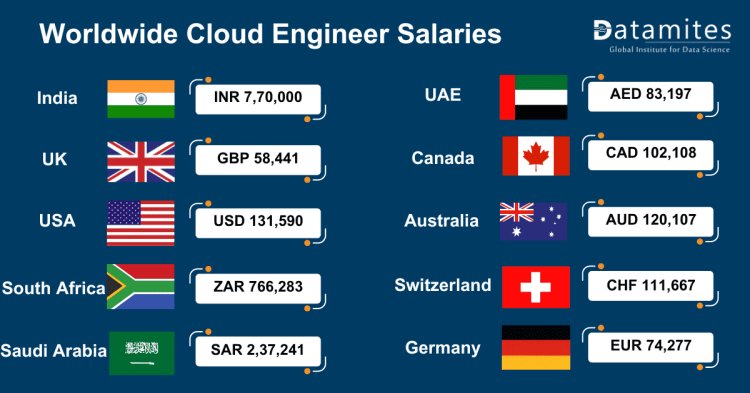
How to find the best cloud computing course Institute?
To find the best cloud computing course institute, consider the following steps:
- Define Your Goals: Determine your specific learning objectives, whether you're aiming to become a cloud engineer, architect, or developer.
- Research Institutes: Look for reputable institutions, universities, or training providers that offer cloud computing courses. Take into account factors such as geographical location, institutional reputation, and the range of programs available.
- Curriculum and Content: Review the course curriculum to ensure it covers relevant topics and technologies in cloud computing, including hands-on practical experience.
- Faculty Expertise: Investigate the qualifications and experience of the instructors or professors.
- Course Format: Consider whether the institute offers online, in-person, or blended learning options that fit your schedule and preferences.
- Internship Opportunities: Seek institutes that offer internship programs or collaborations with industry partners, providing practical experience and networking opportunities in the cloud computing field.
- Certification Preparation: Check if the course provides preparation for industry-recognized cloud computing certifications from cloud providers like AWS, Azure, or Google Cloud.
- Internship or Practical Training: Look for programs that offer opportunities for hands-on practice, internships, or real-world projects.
- Cost and Financial Aid: Compare tuition fees and check if there are any scholarships, grants, or financial aid options available.
- Career Services: Inquire about career support, job placement assistance, and alumni networks to help you transition into the workforce.
A career in cloud computing offers promising opportunities in a rapidly evolving field. With increasing demand for cloud services across various industries, professionals in cloud engineering, architecture, and security are essential for businesses seeking scalability, cost-efficiency, and innovation. Embracing this dynamic field can lead to a fulfilling and future-proof career path with ample room for growth and specialization.
PowerBI
In today's data-driven era, the emergence of Power BI has transformed how organizations analyze and visualize their data. With its capability to efficiently gather, process, and present data insights, Power BI has become an indispensable tool for businesses aiming to enhance decision-making, gain actionable insights, and drive growth.
A report by Fortune Business Insights states that the global business intelligence market was valued at $27.11 billion in 2022. It's projected to grow from $29.42 billion in 2023 to $54.27 billion by 2030, exhibiting a compound annual growth rate (CAGR) of 9.1%. Harnessing the power of Power BI is now a strategic imperative for maintaining competitiveness and agility in the contemporary business landscape.
Why the Power BI course?
The Power BI course is essential for individuals and businesses seeking to harness the full potential of their data. This comprehensive training empowers participants to create insightful and interactive data visualizations, enabling data-driven decision-making. With Power BI, you can seamlessly connect to various data sources, transform raw data into meaningful insights, and share compelling reports and dashboards, making it a valuable skill set for professionals in today's data-driven world.
What is the Scope and Opportunity of Power BI
Scope of Power BI:
The scope of Power BI is extensive and ever-expanding. As organizations increasingly rely on data-driven insights, the demand for professionals with Power BI expertise is on the rise. Whether you're interested in data analysis, business intelligence, or reporting, Power BI offers a versatile platform that can be applied across various industries and sectors.
Opportunity in Power BI:
The opportunities in Power BI are abundant and promising. Skilled Power BI professionals are sought after by businesses looking to gain a competitive edge through data analytics. Job roles such as data analysts, business intelligence developers, and reporting specialists are open to those proficient in Power BI. Moreover, freelance and consulting opportunities are also available for individuals who can provide Power BI solutions to multiple clients.
What are the Top Companies and Industries Hiring Power BI developers?
Power BI developers are in high demand across a multitude of industries, including finance, healthcare, manufacturing, and retail. Prominent companies such as Microsoft, Amazon, Deloitte, Walmart, and Johnson & Johnson are among the leading organizations actively seeking Power BI developers to enhance their data analytics and reporting capabilities. This widespread demand underscores the versatile applications of Power BI expertise across various sectors, making it a valuable skill set in today's job market.
What are the Eligibility and Skills required to become a Power BI developer?
To become a Power BI developer, you'll need a combination of education, skills, and certifications. Here are the typical eligibility criteria, skills, and certifications required
Eligibility:
- Education: A bachelor's degree in a related field such as computer science, information technology, business intelligence, or data analytics is often preferred, but not always mandatory. Relevant work experience can sometimes compensate for the lack of a degree.
- Experience: Many employers prefer candidates with prior experience in data analysis, business intelligence, or database management. Entry-level positions might require 1-2 years of relevant experience, while senior roles may require more.
Skills:
- Power BI Proficiency: You must have a strong command of Power BI, including data modeling, data transformation, visualization creation, and report/dashboard development.
- Data Analysis: Solid skills in data analysis, including the ability to clean, transform, and manipulate data to derive meaningful insights.
- SQL Knowledge: Understanding of SQL (Structured Query Language) is often required, as it's used to retrieve and manipulate data from databases.
- Data Visualization: Knowledge of best practices in data visualization and the ability to create compelling visual representations of data.
- Business Acumen: Understanding of the business domain you're working in, as well as the ability to translate business requirements into data solutions.
- Problem-Solving: Strong analytical and problem-solving skills to tackle complex data challenges.
- Communication: Excellent communication skills to convey data insights effectively to both technical and non-technical stakeholders.
Certifications:
Certifications can boost your credentials as a Power BI developer. Some relevant certifications include:
- Microsoft Certified: Power BI Certification: Microsoft offers various certification exams, such as the Microsoft Certified: Power BI Desktop Certification, which validates your expertise in using Power BI.
- Data Analytics or Business Intelligence Certifications: Certifications from organizations like Tableau, Qlik, or other business intelligence platforms can also be beneficial.
- SQL Certifications: If you lack SQL skills, certifications like Microsoft's MCSA: SQL 2016 Database Development can be helpful.
- Business Analysis Certifications: Certifications like Certified Business Analysis Professional (CBAP) or Certified Analytics Professional (CAP) can enhance your business acumen.
How much is the PowerBI Developer's salary worldwide?
- The salary of a PowerBI Developer in UK ranges from GBP 45,024 per year according to a Talent.com report.
- The salary of a PowerBI Developer in USA ranges from USD 110,000 per year according to a Talent.com report.
- The salary of a PowerBI Developer in Canada ranges from CAD 71,000 per year according to a PayScale report.
- The salary of a PowerBI Developer in Australia ranges from AUD 130,000 per year according to a Talent.com report.
- The salary of a PowerBI Developer in Germany ranges from EUR 50,000 per year according to a PayScale report.
- The salary of a PowerBI Developer in Saudi Arabia ranges from SAR 138,000 per year according to a PayScale report.
- The salary of a PowerBI Developer in India ranges from INR 5.5 LPA according to the Ambition Box report.
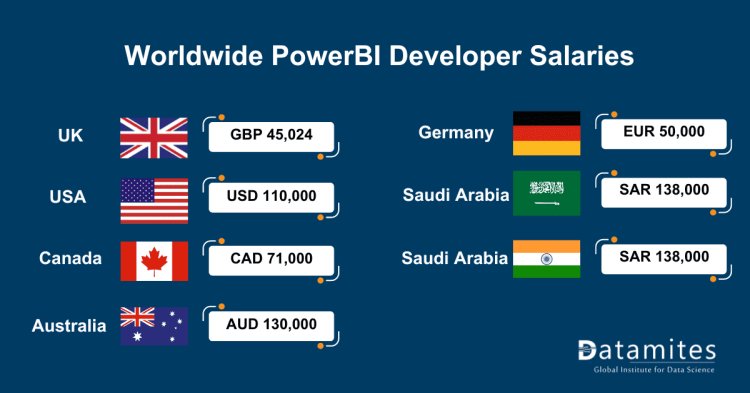
How to choose the right Power BI Course Institute?
Choosing the right Power BI course institute is essential to ensure you receive high-quality training that aligns with your learning goals and career objectives. Here are some key factors to consider when selecting a Power BI course institute:
Course Content and Curriculum:
Examine the course content and curriculum thoroughly to ensure it encompasses the topics and skills you aim to acquire. Look for a course that includes hands-on exercises and real-world projects.
Instructor Expertise:
Check the qualifications and experience of the instructors. Instructors with industry experience and relevant certifications are more likely to provide valuable insights.
Reputation and Reviews:
Look for reviews and testimonials from past students. A reputable institute should have positive feedback and a good reputation in the field.
Certifications and Accreditation:
Verify whether the institute provides recognized certifications upon successfully completing the course. Certifications can enhance your resume and credibility as a Power BI developer.
Internship Opportunities:
When selecting a Power BI Training, consider the availability of internship opportunities as an additional factor. Some institutes may have partnerships with companies that offer internships, providing you with practical experience and networking opportunities to enhance your Power BI skills and career prospects.
Mode of Delivery:
Determine whether the course is offered in-person, online, or as a combination of both. Choose a mode that suits your schedule and learning preferences.
Support and Resources:
Inquire about the availability of support, such as access to instructors or mentors, discussion forums, and supplementary learning materials.
Cost and Financial Considerations:
Compare the course fees and check for any hidden costs. Consider the value you'll receive in terms of skills and career advancement.
Job Placement Assistance:
Certain institutions provide job placement assistance or career support services. This can be valuable if you're looking to transition into a Power BI-related role.
A career in Power BI offers a promising path for individuals looking to excel in the world of data analytics and business intelligence. With the increasing demand for data-driven decision-making across industries, Power BI professionals are highly sought after. This field provides opportunities for creativity in data visualization, problem-solving, and the chance to impact organizations by transforming raw data into actionable insights.
Digital Marketing
In today's digital era, the success of businesses relies on their capacity to engage and retain customers through efficient digital marketing strategies. The evolving landscape of marketing demands a workforce equipped with the latest skills and knowledge to navigate this dynamic terrain.
According to an Expert Market Research report, In 2023, the worldwide market for digital marketing was valued at close to USD 363.05 billion. It is forecasted to experience a growth rate of 13.1% CAGR from 2024 to 2032, aiming to achieve a market size of approximately USD 1099.33 billion by 2032.
As businesses increasingly rely on digital platforms to connect with their audience, the demand for professionals skilled in these new approaches has surged, making digital marketing expertise an indispensable asset for modern enterprises.
Why a digital marketing course?
A digital marketing course is essential in today's fast-paced, technology-driven business landscape. It equips individuals with the knowledge and skills needed to effectively promote products or services online. In an increasingly digital world, businesses must harness the power of digital channels such as social media, search engines, email, and content marketing to reach and engage their target audience. A digital marketing course provides valuable insights into these channels, teaches strategies for optimizing online presence, and helps students stay updated on the latest industry trends.
What is the Scope and Opportunity of digital marketing?
Scope of Digital Marketing:
Digital marketing offers a vast scope in today's business landscape. With the continuous growth of the internet and technology, businesses of all sizes are increasingly shifting their marketing budgets towards digital channels. This shift has created a high demand for skilled digital marketers who can navigate the complex world of online advertising, SEO, content marketing, social media, and more.
According to a Noble Desktop report, the digital marketing sector is anticipated to see a 10% expansion from 2021 to 2031, propelled by developments in artificial intelligence, virtual and augmented reality, and content marketing. From job opportunities in digital marketing agencies to in-house marketing roles within companies, the scope for digital marketing professionals is diverse and continually expanding.
Opportunities in Digital Marketing:
The opportunities in digital marketing are abundant and varied. Professionals in this field can pursue careers as digital marketing managers, SEO specialists, content marketers, social media managers, email marketing experts, data analysts, and more. Additionally, there are opportunities to specialize in niche areas such as influencer marketing, affiliate marketing, and e-commerce optimization. With the flexibility to work remotely and the potential for lucrative income, digital marketing offers individuals a chance to thrive in a rapidly evolving industry.
What are the Top Companies and Industries Hiring Digital Marketing Executives?
Digital marketers are in high demand across various industries such as e-commerce, retail, healthcare, hospitality, education, and technology. Leading companies like Amazon, Google, Facebook, LinkedIn, HubSpot, and numerous others actively seek skilled digital marketing professionals to strengthen their online presence and drive business growth. With this widespread demand, digital marketing offers a diverse range of career opportunities and the chance to work with some of the world's most influential organizations.
What is the Eligibility, Skills and Certificate required to become a digital marketing executive?
To become a digital marketing executive, there are no strict educational prerequisites, but having a relevant background can be beneficial. Here are the eligibility criteria, essential skills, and certificates that can help you succeed in this role:
Eligibility:
Educational Background: While not mandatory, a bachelor's degree in marketing, business, communication, or a related field can be advantageous. However, many digital marketers come from diverse educational backgrounds.
Essential Skills:
- Digital Marketing Knowledge: A deep understanding of digital marketing concepts, strategies, and tools is crucial.This encompasses search engine optimization (SEO), search engine marketing (SEM), social media marketing, email marketing, content marketing, and analytics..
- Analytical Skills: Being able to analyze data, track campaign performance, and make data-driven decisions is essential.
- Creativity: Digital marketing often involves creating engaging content, advertisements, and campaigns that resonate with the target audience.
- Communication: Strong written and verbal communication skills are necessary for creating effective marketing materials and collaborating with team members.
- Adaptability: The digital marketing landscape is constantly evolving, so adaptability and a willingness to learn are critical.
- Technical Proficiency: Familiarity with digital marketing tools like Google Analytics, Google Ads, social media platforms, and email marketing platforms is advantageous.
Certificates and Courses:
Obtaining relevant certificates and completing courses can enhance your credibility and skills. Some popular certifications and courses include
- Google Ads Certification: Demonstrates proficiency in Google Ads.
- HubSpot Inbound Marketing Certification: Covers inbound marketing fundamentals.
- Facebook Blueprint Certification: Emphasizes advertising on Facebook and Instagram platforms.
- Content Marketing Institute's Content Marketing Certification: Covers content marketing strategies.
- SEO Certification: Various platforms offer certifications in search engine optimization.
How much is the salary of a digital marketing Executive worldwide?
- The salary of a digital marketing executive in UK ranges from GBP 33,035 per year according to a Talent.com report.
- The salary of a digital marketing executive in USA ranges from USD 75,400 per year according to a Talent.com report.
- The salary of a digital marketing executive in Canada ranges from CAD 61,514 per year according to a Glassdoor report.
- The salary of a digital marketing executive in Australia ranges from AUD 65,000 to AUR 85,000 per year according to a Seek report.
- The salary of a digital marketing specialist in Germany ranges from EUR 54,753 per year according to an Economic Research Institute report.
- The salary of a digital marketing manager in Switzerland ranges from CHF 91414 per year according to a PayScale report.
- The salary of a digital marketing manager in Saudi Arabia ranges from SAR 90,000 per year according to a Talent.com report.
- The salary of a digital marketing manager in South Africa ranges from ZAR 378750 per year according to a Talent.com report.
- The salary of a digital marketing manager in India ranges from INR 4.0 LPA according to the Ambition Box report.
- The salary of a digital marketing manager in UAE ranges from AED 7,000 per year according to a Gulf Talent report.
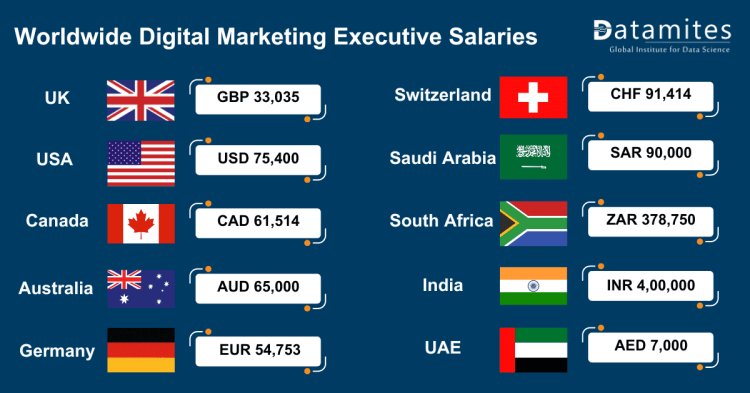
How to select the right digital marketing course institute?
Selecting the right digital marketing course institute is crucial to ensure you receive quality education and relevant skills. Below are some steps to assist you in selecting the appropriate institute:
- Define Your Goals: Determine your specific digital marketing goals and objectives. Are you looking to gain a broad understanding of digital marketing, specialize in a particular area, or obtain a certification? Your goals will influence your choice of institute.
- Research Institutes: Conduct thorough research to identify institutes that offer digital marketing courses. Look for reputable and well-established institutions, as well as specialized digital marketing training providers.
- Check Accreditation: If you are considering a formal degree program, check if the institute is accredited by relevant educational authorities. For short-term courses and certifications, ensure the institute is recognized by industry leaders or associations.
- Course Content: Examine the course curriculum. It should cover a wide range of digital marketing topics and provide hands-on experience.Verify that the content matches your learning goals.
- Instructors Qualifications: Research the qualifications and experience of the course instructors. They should have real-world experience in digital marketing and be up-to-date with industry trends.
- Facilities and Resources: Visit the institute if possible or explore its online learning platform. Ensure they have the necessary resources, technology, and support systems for effective learning.
- Internship Opportunities: Consider the institute's internship opportunities, as hands-on experience through internships can significantly enhance your practical skills and industry connections, making it an essential aspect of your education.
- Certifications: Check if the institute offers recognized digital marketing certifications upon course completion. These certifications can enhance your resume and credibility as a digital marketer.
- Cost and Financial Aid: Consider the course fees and any available financial aid options. Compare the costs with the value and quality of the education provided.
- Flexibility: Assess the flexibility of the course delivery. Does it offer online or offline options? Can you fit the course schedule into your existing commitments?
- Job Placement Assistance: Inquire about job placement services or assistance provided by the institute. A strong network and job support can be valuable after completing your course.
A career in digital marketing offers a world of opportunities in a rapidly evolving digital landscape. With the right education and skills, you can become a valuable asset to businesses across industries, drive online success, and embark on a rewarding and dynamic journey in the world of digital marketing.
Python
Python, a versatile and high-level programming language, serves as a fundamental tool for developers and data scientists alike. Python's simplicity and readability make it an ideal choice for a wide range of applications, including web development, data analysis, machine learning, and automation.
According to Regional Research Reports, the anticipated global market size for Python web frameworks is set to rise from $14 billion in 2022 to a significant $17.88 billion by 2033, with an estimated Compound Annual Growth Rate (CAGR) of 1.8% from 2023 to 2033.
By mastering Python, individuals can expand their career opportunities and gain essential skills for today's technology-driven landscape.
Why a Python course?
A Python course is essential for aspiring programmers and professionals because Python is a versatile and widely-used programming language. Providing simplicity and readability, it stands as an excellent choice for beginners. Python's vast ecosystem and libraries support a wide range of applications, from web development and data analysis to artificial intelligence and automation. Learning Python opens up numerous career opportunities and equips individuals with valuable skills in today's technology-driven world.
What is the scope and opportunity of Python?
Scope of Python:
Python has a wide and promising scope in the world of programming and technology. It is a versatile and easy-to-learn language, making it suitable for a variety of applications. Python finds extensive application in web development, data analysis, artificial intelligence, machine learning, scientific computing, and various other domains. Its robust libraries and frameworks, such as Django and Flask for web development, TensorFlow and PyTorch for deep learning, and pandas for data manipulation, make it a top choice for developers and data scientists.
As per a report by TOPS Technologies, the foreseeable future anticipates a growth rate of 15-20% in the demand for Python developers within the Indian job market.
Opportunity of Python:
Python offers abundant opportunities in the job market and career advancement. It is in high demand across industries due to its versatility and efficiency. Python developers are sought after for roles ranging from web developers and data analysts to machine learning engineers and DevOps engineers. The demand for Python professionals is expected to grow as technology continues to evolve.
Read the following articles:
- Python Course Fee in India
- Guide to Python Programming Career
- Python Libraries For Data Science
- Why Python is Important for Data Science Course
What are the Top Companies and Industries Hiring Python Developers?
Python developers are in high demand across a wide spectrum of industries. Prominent companies, including tech giants like Google, Amazon, and Microsoft, as well as IT service providers like Tata Consultancy Services and Wipro, are actively recruiting Python developers to cater to their diverse technological requirements. Industries such as finance, healthcare, manufacturing, and retail are among those seeking top-notch Python developers to drive innovation and meet their evolving software development needs.
What is the Eligibility, Skills and Certificate required to become an Python Developer?
To become a Python developer, there are certain eligibility criteria, skills, and certificates that can be beneficial for your career. Here's an overview:
Eligibility:
Educational Background: While a formal degree is not always required, most Python developers have a bachelor's degree in computer science, information technology, or a related field. However, many successful developers are self-taught or have learned through coding bootcamps and online courses.
Skills:
- Proficiency in Python: You must have a strong grasp of Python programming language, including its syntax, libraries, and best practices.
- Problem-Solving Skills: Python developers should excel at problem-solving and be able to break down complex problems into manageable tasks.
- Database Knowledge: Understanding and working with databases, both SQL and NoSQL, is essential.
- Version Control/Git: Proficiency in using version control systems like Git is crucial for collaboration and code management.
- Debugging and Testing: Being able to debug code effectively and write unit tests is important for maintaining code quality.
- Understanding of Algorithms and Data Structures: Strong fundamentals in algorithms and data structures can be valuable, especially for more complex Python development roles.
Certificates:
Obtaining certificates can demonstrate your expertise and commitment to potential employers. Here are some relevant certificates:
- Python Certifications: There are various Python certification programs available, such as those from Python.org or certifications related to specific Python frameworks like Django.
- Web Development Certifications: If you're interested in web development, you can consider certifications in Django, Flask, or front-end technologies like HTML/CSS/JavaScript.
- Database Certifications: Certifications related to databases like MySQL, PostgreSQL, or MongoDB can be beneficial
- General Software Development Certifications: Certifications like CompTIA's A+ or Microsoft's MTA can provide a broad foundation for software development skills.
- Machine Learning/AI Certifications (For Specialization): Certifications from online platforms can be valuable if you're keen on machine learning or AI with Python.
How much is the Python developer's salary worldwide?
- The salary of a Python developer in UK ranges from GBP 57,500 per year according to a Talent.com report.
- The salary of a Python developer in USA ranges from USD 112,475 per year according to an Indeed report.
- The salary of a Python developer in Canada ranges from CAD 89,074 per year according to an Indeed report.
- The salary of a Python developer in Australia ranges from AUD 144,561 per year according to an Indeed report.
- The salary of a Python developer in Germany ranges from EUR 90,145 per year according to a Salary Expert report.
- The salary of a Python developer in Switzerland ranges from CHF 95,000 per year according to a Glassdoor report.
- The salary of a Python developer in Saudi Arabia ranges from SAR 193,000 per year according to a Salary Explorer report.
- The salary of a Python developer in India ranges from INR 6,81,134 per year according to an Indeed report.
- According to a report from Indeed, the annual salary for a Python developer in the UAE ranges from AED 97,050.
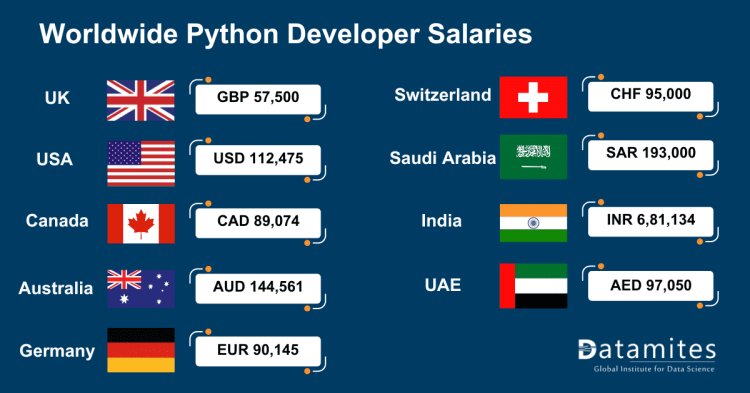
How to select the Python Developer Course Institute?
Selecting the right Python developer course institute is crucial to ensure you receive quality education and training. Here are several steps to assist you in making a well-informed decision:
Define Your Goals:
Determine your specific goals and objectives for learning Python. Are you looking to become a professional Python developer, a data scientist, a web developer, or something else? The type of course you should select will be influenced by your goals.
Research Course Options:
Look for Python developer courses that align with your goals. You can find courses at universities, colleges, coding bootcamps, online platforms, and more. Consider factors like course duration, format (in-person or online), and the curriculum.
Check Accreditation and Reputation:
Ensure that the institute or platform offering the course is reputable and accredited, especially if you plan to earn a certification or degree. Look for feedback, ratings, and testimonials provided by previous students.
Curriculum:
Examine the course syllabus thoroughly to confirm it addresses the topics and skills you intend to learn. It should include a mix of Python fundamentals, libraries, frameworks, and hands-on projects.
Instructor Qualifications:
Research the qualifications and experience of the instructors. Instructors with industry experience and a strong background in Python development are more likely to provide valuable insights.
Delivery Format:
Take into account the format that aligns with your learning style and availability. Some courses offer self-paced options, while others follow fixed schedules. Choose one that fits your lifestyle and commitments.
Cost and Financial Aid:
Compare the course cost with your budget constraints. Some institutes offer scholarships, payment plans, or financial aid options to make the course more affordable.
Student Support and Resources:
Check what kind of support and resources the institute offers. This could include access to a community, forums, mentors, career services, and additional learning materials.
Hands-on Experience:
Practical experience is crucial for learning Python effectively. Ensure that the course includes projects, assignments, and coding exercises to apply what you've learned.
Certification:
If certification is important to you, check whether the course offers a recognized Python certificate upon completion.
A career in Python offers a world of opportunities. With its versatility, extensive libraries, and strong demand across various industries, Python provides a solid foundation for aspiring developers to build successful and rewarding careers in fields such as web development, data science, machine learning, and more.
DevOps
DevOps, a methodology that unites development and operations, accelerates software development, making it essential for businesses aiming to maintain competitiveness in today's fast-paced market landscape. This collaborative approach enhances efficiency and agility, ensuring a competitive edge.
The DevOps market achieved a milestone in 2022, surpassing a valuation of USD 8 billion. It is anticipated to exhibit a robust Compound Annual Growth Rate (CAGR) of 20% from 2023 to 2032. This growth is primarily attributed to the increasing demand for streamlining software development processes and expediting delivery within the industry.
Why a DevOps Course?
A DevOps course is a wise choice for individuals and organizations alike. In an increasingly digital and competitive business environment, DevOps practices enable efficient collaboration between development and operations teams, leading to faster software delivery, improved quality, and enhanced customer satisfaction. Acquiring DevOps skills equips professionals with the ability to streamline workflows, automate processes, and stay at the forefront of the technology landscape, making it a valuable investment for career growth and organizational success.
What is the scope and opportunities of DevOps?
Scope of DevOps:
DevOps comprises practices that bridge the divide between software development and IT operations, with the goal of automating and streamlining the software delivery process. The scope of DevOps is vast, encompassing various stages of the software development lifecycle. It includes continuous integration, continuous delivery, infrastructure as code, automated testing, and monitoring. DevOps professionals are in high demand as organizations seek to improve their software development processes, reduce time to market, and enhance the quality of their products and services.
Opportunities in DevOps:
DevOps offers numerous opportunities for individuals looking to advance their careers in technology. DevOps engineers, automation specialists, and release managers are just a few of the roles in high demand. These experts focus on automating deployment pipelines, overseeing infrastructure management, and ensuring the reliability and scalability of software applications. With the increasing adoption of cloud technologies and containerization, the demand for DevOps expertise is on the rise.
The job listings for DevOps positions on indeed.com have experienced a significant upsurge, showing a remarkable 75% increase. This surge underscores the growing demand for DevOps professionals in the job market, reflecting the industry's recognition of the value they bring to software development and operations teams.
What are the Top Companies and Industries Hiring DevOps Engineers?
Prominent organizations like Amazon, Microsoft, Google, IBM, and Accenture actively seek out DevOps specialists for their teams. The fervent demand for DevOps roles extends across diverse sectors, including IT, finance, healthcare, and e-commerce, underscoring the universal appeal of this career path. This widespread need for DevOps expertise opens up a plethora of opportunities for professionals in this field.
What is the Eligibility and Skills required to become a DevOps Engineer?
To become a DevOps engineer, you'll need a combination of education, skills, and certifications. Here are the typical eligibility requirements, essential skills, and recommended certifications:
Eligibility:
Education: A bachelor's degree in computer science, information technology, or a related field is commonly required, though some organizations may consider equivalent work experience.
Work Experience: Many employers prefer candidates with relevant work experience, typically ranging from 2 to 5 years in roles such as system administration, software development, or IT operations.
Essential Skills:
- Scripting and Coding: Proficiency in scripting languages like Python, Ruby, or Shell is crucial. Knowledge of programming languages like Java or C++ can also be beneficial.
- Automation: Strong automation skills using tools like Ansible, Puppet, or Chef to streamline and manage infrastructure and application deployment.
- Containerization and Orchestration: Understanding of containerization platforms like Docker and container orchestration tools like Kubernetes.
- Version Control: Familiarity with version control systems like Git for tracking changes in code and configurations.
- CI/CD Pipelines: Knowledge of Continuous Integration (CI) and Continuous Deployment (CD) pipelines using tools like Jenkins, Travis CI, or GitLab CI/CD.
- Cloud Computing: Proficiency in cloud platforms such as AWS, Azure, or Google Cloud to deploy and manage cloud-based infrastructure.
- Monitoring and Logging: Experience with monitoring tools like Prometheus, Grafana, and log management solutions like ELK (Elasticsearch, Logstash, Kibana).
- Infrastructure as Code (IaC): Understanding of IaC principles using tools like Terraform or CloudFormation to manage infrastructure.
- Collaboration and Communication: Strong communication skills and the ability to collaborate with cross-functional teams are essential, as DevOps engineers often work closely with developers, QA, and IT operations teams.
Certifications:
- AWS Certified DevOps Engineer: Focuses on AWS-specific DevOps practices and tools.
- Certified Kubernetes Administrator (CKA): Validates your Kubernetes skills and knowledge.
- Docker Certified Associate: Demonstrates proficiency in Docker containerization.
- Certified Jenkins Engineer: Validates your expertise in Jenkins and CI/CD pipelines.
- Certified Puppet Professional (Puppet Labs): Demonstrates proficiency in Puppet configuration management.
How to find the best DevOps Course Institute?
Finding the best DevOps course institute can be a crucial step in your career development. Here are some steps to help you identify the right institute for your needs:
Define Your Goals:
Clarify your objectives and what you want to achieve with a DevOps course. Determine your current skill level and what specific DevOps skills you want to acquire or improve.
Research:
Start by conducting thorough research. Look for DevOps course providers, both online and in your local area. You can use search engines, review websites, and social media platforms to find recommendations and reviews from past students.
Check Accreditation and Reputation:
Verify that the institute holds accreditation and industry recognition. Seek reviews and testimonials from former students to assess the institute's reputation.
Course Content:
Examine the course content and syllabus. Ensure that the course encompasses the topics and skills essential for your learning objectives. Check if the course includes hands-on labs or projects to apply what you learn.
Internship Opportunities:
Look for institutes that offer internship opportunities or connections with companies in the DevOps field. Practical experience can greatly enhance your learning and job prospects.
Instructor Quality:
Find out who will be teaching the course. Look for instructors with relevant industry experience and certifications. Check if the institute provides information about the instructors credentials.
Mode of Delivery:
Consider your preferred mode of learning. Institutes may offer in-person, online, or blended (a combination of both) courses. Choose the mode that best suits your schedule and learning style.
Certification:
Determine if the institute offers a certification upon course completion. A recognized certification can add value to your resume and validate your skills.
Cost and Financial Aid:
Consider the course fees and whether the institute offers financial aid, scholarships, or payment plans. Compare costs with the value provided by the course.
Career Guidance:
Choose an institute that provides robust career guidance services, including resume building, interview preparation, and job placement assistance, to help you transition into a DevOps role successfully.
A DevOps career offers a dynamic path where professionals can continually adapt to evolving technology landscapes, fostering collaboration, automation, and rapid software delivery. It's a rewarding journey for those passionate about streamlining processes and driving innovation in the realm of software development and IT operations.
DataMites presents an all-encompassing platform catering to aspiring data scientists. Our wide-ranging programs cover data science, artificial intelligence, Python, machine learning, and more. With an engaged community of over 70,000+ learners, our mission is to equip individuals with in-demand skills. Our data science courses boast prestigious IABAC accreditation, ensuring both quality and industry acknowledgement. Begin your data-driven journey with DataMites, where knowledge intersects with opportunities.
DataMites Institute is a premier provider of specialized training in Data Science, AI, Machine Learning, Python, and more, tailored to meet the needs of today’s tech industry. We offer top-tier education in Data Science, Artificial Intelligence, Machine Learning, Python Development, Data Analytics, Data Engineering, and IoT, establishing ourselves as the ultimate destination for cutting-edge tech education.


